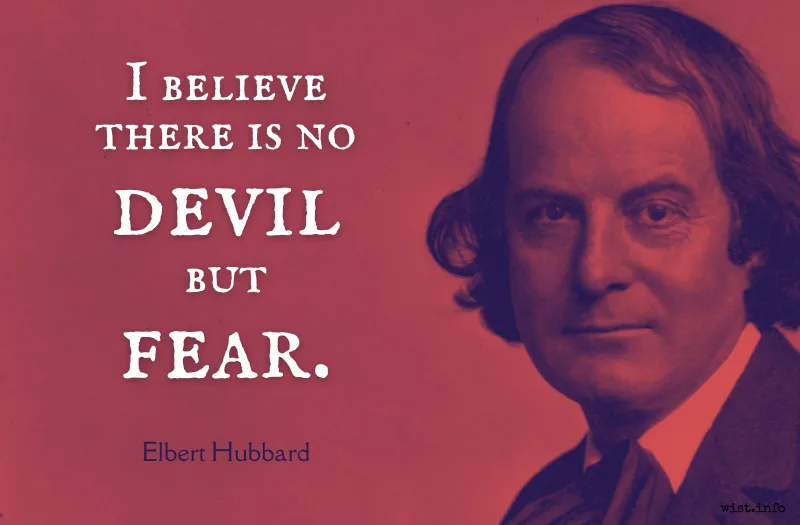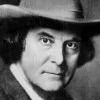I believe there is no devil but fear.
Quotations by:
Hubbard, Elbert
If you work for a man, in heaven’s name work for him! If he pays you wages that supply you your bread and butter, work for him — speak well of him, think well of him, stand by him and stand by the institution he represents. I think if I worked for a man I would work for him. I would not work for him a part of the time, and the rest of the time work against him. I would give an undivided service or none.
If put to the pinch, an ounce of loyalty is worth a pound of cleverness.
The graveyards are full of people the world could not do without.
Elbert Hubbard (1856-1915) American writer, businessman, philosopher
“The Philistine” (May 1907)
(Source)
Sometimes misquoted as:Also attributed to Charles DeGaulle, Georges Clemenceau, and many others. More discussion: The Graveyards Are Full of Indispensable Men – Quote Investigator.
- "The graveyards are full of indispensable men"
- "The cemeteries are full of indispensable men."
- "The cemeteries are filled with people who thought the world could not get along without them."
I have carried a dinner pail and worked for day’s wages, and I have also been an employer of labor, and I know there is something to be said on both sides. There is no excellence, per se, in poverty; rags are no recommendation; and all employers are not rapacious and high-handed, any more than all poor men are virtuous.
Elbert Hubbard (1856-1915) American writer, businessman, philosopher
A Message to Garcia (1899)
Full text.
Your friend is the man who knows all about you, and still likes you.
Elbert Hubbard (1856-1915) American writer, businessman, philosopher
A Thousand and One Epigrams (1911)
(Source)
Reprinted in The Notebook of Elbert Hubbard (1927).
Genius is often only the power of making continuous efforts. The line between failure and success is so fine that we scarcely know when we pass it — so fine that we are often on the line and do not know it. How many a man has thrown up his hands at a time when a little more effort, a little more patience, would have achieved success. As the tide goes clear out, so it comes clear in. In business sometimes prospects may seem darkest when really they are on the turn. A little more persistence, a little more effort, and what seemed hopeless failure may turn to glorious success. There is no failure except in no longer trying. There is no defeat except from within, no really insurmountable barrier save our own inherent weakness of purpose.
Elbert Hubbard (1856-1915) American writer, businessman, philosopher
Electrical Review (c. 1895)
Original source not found, but as such in Evelyn Briggs Baldwin, The Search for the North Pole (1896). Later published in various works by Hubbard, including FRA Magazine : A Journal of Affirmation (1915), and An American Bible (1918) (ed. Alice Hubbard).
If you would escape moral and physical assassination, do nothing, say nothing, be nothing — court obscurity, for only in oblivion does safety lie.
Elbert Hubbard (1856-1915) American writer, businessman, philosopher
Little Journeys to the Homes of American Statemen, “William H. Seward” (1916)
(Source)
Variants show up elsewhere in Hubbard's writings and and his quote epigrams.Often misattributed to Aristotle.
- To escape criticism -- do nothing, say nothing, be nothing.
- To avoid unkind criticism: do nothing, say nothing, be nothing.
- There is only one way to avoid criticism: do nothing, say nothing and be nothing.
Constant effort and frequent mistakes are the stepping-stones of genius.
Elbert Hubbard (1856-1915) American writer, businessman, philosopher
Little Journeys to the Homes of the Great, Vol. 12: Little Journeys to the Homes of Great Scientists, “William Herschel” (1916)
(Source)
If your religion does not change you, then you had better change your religion.
Elbert Hubbard (1856-1915) American writer, businessman, philosopher
One Thousand & One Epigrams (1911)
(Source)
Men who marry for gratification, propagation or the matter of buttons or socks, must expect to cope with and deal in a certain amount of quibble, subterfuge, concealments, and double, deep-dyed prevarication.
The great Big Black Things that have loomed against the horizon of my life, threatening to devour me, simply loomed and nothing more. The things that have really made me miss my train have always been sweet, soft, pretty, pleasant things of which I was not in the least afraid.
Life is just one damn thing after another.
Elbert Hubbard (1856-1915) American writer, businessman, philosopher
The Philistine (1909-12)
(Source)
Elbert is likely not the first to express this, though he helped to popularize it. The phrase is presented in The Philistine in a list of aphorisms, uncredited and uncited. Hubbard was the editor of the magazine, and a presumed contributor. Soon collected in Hubbard's A Thousand & One Epigrams (1911).
The earliest documented forms of this phrase show up in 1909 in various periodicals (such as Hubbard's Philistine). Also in 1909, Lilian Bell published The Concentrations of Bee:“Bob has a motto on his wall which says ‘Life is just one damned thing after another!'” said Jimmie. But I refused to smile. I was too distinctly annoyed.
Note that the phrase is showing up (in the book) as second-hand, not necessarily as something Bell wrote.
The phrase is often attributed to Mark Twain. It is not found in Twain's works. The earliest attribution to him found is in H. L. Mencken, The American Language: A Preliminary Inquiry Into the Development of English in the United States, Sec. 9 (1919), where he says that the Twain is "commonly credited" with the phrase.
Variants:More information about this quotation: Life Is Just One Damn Thing After Another – Quote Investigator®
- "Life is just one damned thing after another."
- "Life is just one darn thing after another."
See Zelazny.
Piety is the tinfoil of pretense.
Elbert Hubbard (1856-1915) American writer, businessman, philosopher
The Philistine (Sep 1908)
Full text.
The greatest mistake you can make in life is to be continually fearing you will make one.
Elbert Hubbard (1856-1915) American writer, businessman, philosopher
The Philistine, Vol. 13, #5 (Nov 1901)
Every man is a dam fool at least ten minutes a day. Wisdom consists in not exceeding the limit.
Elbert Hubbard (1856-1915) American writer, businessman, philosopher
The Philistine, Vol. 29, #6 (Nov 1909)Full text.
Sometimes given: "Every man is a damn fool at least five minutes every day; wisdom consists in not exceeding the limit."
If pleasures are greatest in anticipation, just remember that this is also true of trouble.
Elbert Hubbard (1856-1915) American writer, businessman, philosopher
The Philosophy of Elbert Hubbard (1916)
(Source)
Every life is its own excuse for being, and to deny or refute the untrue things that are said of you is an error in judgment. All wrong recoils upon the doer, and the man who makes wrong statements about others is himself to be pitied, not the man he vilifies. It is better to be lied about than to lie. At the last no one can harm us but ourselves.
Elbert Hubbard (1856-1915) American writer, businessman, philosopher
The Roycroft Dictionary and Book of Epigrams (1923)
(Source)
Dogma: A hard substance which forms in a soft brain; a coprolitic idea.
Elbert Hubbard (1856-1915) American writer, businessman, philosopher
The Roycroft Dictionary (1914)
(Source)
Failure: A man who has blundered but is not able to cash in on the experience.
Elbert Hubbard (1856-1915) American writer, businessman, philosopher
The Roycroft Dictionary (1914)
(Source)
Fear: A club used by priests, presidents, kings and policemen to keep the people from recovering stolen goods.
Elbert Hubbard (1856-1915) American writer, businessman, philosopher
The Roycroft Dictionary (1914)
(Source)
Experience: The name every one gives to his mistakes.
Elbert Hubbard (1856-1915) American writer, businessman, philosopher
The Roycroft Dictionary (1914)
(Source)
Righteous Indignation: Your own wrath as opposed to the shocking bad temper of others.
Elbert Hubbard (1856-1915) American writer, businessman, philosopher
The Roycroft Dictionary (1914)
(Source)
Orthodoxy:
- In religion, that state of mind which congratulates itself on being absolutely right, and a belief that all who think otherwise are wholly wrong.
- A faith in the fixed — a worship of the static.
- The joy that comes from thinking that most everybody is lined up for Limbus with no return ticket.
- A condition brought about by the sprites of Humor, according to the rule that whom the gods would destroy they first make mad.
- The zenith of selfishness and the nadir of egotism.
- Mephisto with a lily in his hand.
- A corpse that does not know it is dead.
- Spiritual constipation.
- That peculiar condition where the patient can neither eliminate an old idea or absorb a new one.
Elbert Hubbard (1856-1915) American writer, businessman, philosopher
The Roycroft Dictionary (1914)
(Source)
Forecast: To observe that which has passed, and guess it will happen again; to anticipate the future by guessing at the past; to predict that an event will happen, if it does, by basing calculations on events that have already happened, if they did.
Elbert Hubbard (1856-1915) American writer, businessman, philosopher
The Roycroft Dictionary (1914)
(Source)
It is a curious fact (or it isn’t) that of all the illusions that beset mankind none is quite so curious as that tendency to suppose that we are mentally and morally superior to those who differ from us in opinion.
Elbert Hubbard (1856-1915) American writer, businessman, philosopher
The Selected Writings of Elbert Hubbard [ed. Ben Hubbard] (1922)
Full text.
Man’s greatest blunder has been in trying to make peace with the skies instead of making peace with his neighbors.
Elbert Hubbard (1856-1915) American writer, businessman, philosopher
In The Philistine (Sep 1910)
(Source)
Reprinted in The Philosophy of Elbert Hubbard, "Epigrams" (1916) [ed. Hoyle].




